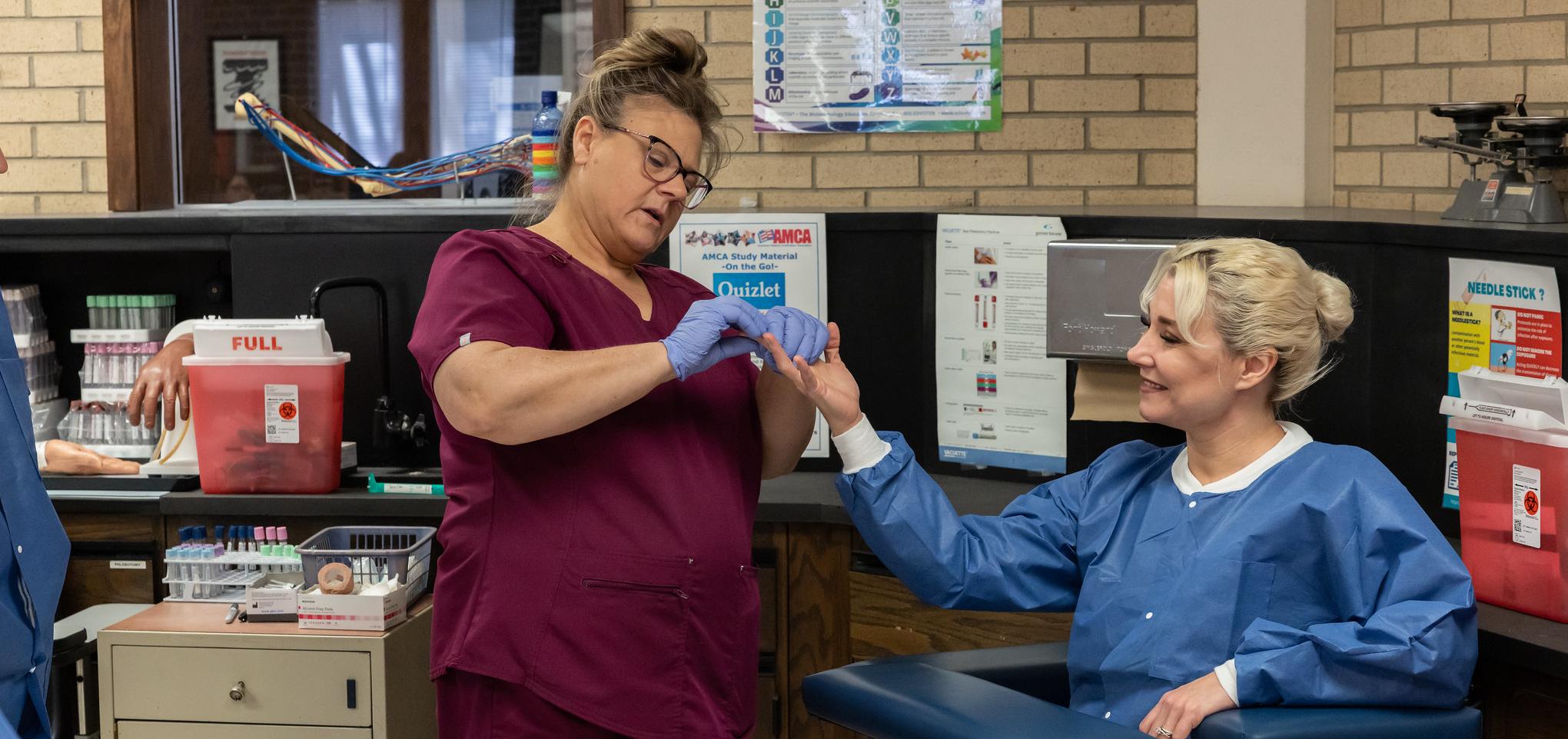
Phlebotomists are medical professionals trained to collect blood and other specimens for lab analysis—an essential first step in diagnosing and treating patients. This in-demand role is a great starting point in healthcare and can lead to advanced careers, such as Medical Laboratory Technology. Get the skills, experience, and confidence to begin your path in patient care with Barton’s Liberal Studies and Career Technical Program in Phlebotomy!
Barton’s Phlebotomy program has two parts:
- Principles of Phlebotomy class and hands-on lab hours.
- Phlebotomy clinical practicum.
The course is offered in an 8-week or regular semester 16-week session and requires a cooperative lab for the duration of the course. Lab hours can be completed on the Great Bend Barton campus or in a pre-approved hospital in your area. Following successful completion of the Principles of Phlebotomy course, a Phlebotomy clinical practicum of 100-120 hours in a hospital-based clinical rotation must be completed to be eligible for National Certification.

Barton Benefits
At Barton, our areas of study are designed to equip students with the knowledge, skills, and critical thinking necessary to thrive in today’s world. Whether you're just beginning your educational journey or advancing your career, we offer flexible and rigorous programs that support your goals.
- Career-Ready in Just 8 to 16 Weeks
Complete your training quickly and start working in the healthcare field. - Hands-On Training
Learn essential phlebotomy skills through real-world lab and clinical experiences. - Flexible Scheduling Options
Choose from multiple 8-week and 16-week class sessions to fit your schedule. - Affordable Tuition
Get high-quality training at a lower cost compared to many other programs. - Transfer-Friendly Pathway
Use your phlebotomy training as a stepping stone to careers like Medical Laboratory Assistant. - Support Every Step of the Way
Advisors guide you through enrollment, course selection, and certification prep.
Certification and licensure requirements for phlebotomists vary by state. Some states have additional regulations not covered by Barton’s program.
*This program is not approved for students in California or New York.
States with differing licensure requirements include:
California, Hawaii, Florida, New York, North Dakota, Tennessee, Louisiana, Nevada, West Virginia, Montana, Georgia, and Puerto Rico.
Prospective Phlebotomy students who plan to locate in a state other than Kansas should contact that state for specific information relative to that state’s laboratory practice act before enrolling. Visit ascls.org for more information.
Program Enrollment Information
Enrollment for Spring 2026 is now open!
-
Spring 2026 Options:
- 16-Week Class: Begins January 19, 2026
- 1st 8-Week Class: Begins January 19, 2026
- 2nd 8-Week Class: Begins March 16, 2026
Note: Phlebotomy courses are no longer self-enroll.
Be sure to review the Guide for Getting Started before completing the Phlebotomy Enrollment Agreement Form. Your advisor will enroll you after all steps are completed.
Hands-On Training. Career-Ready Skills.
Explore the links below for important information about Barton’s Phlebotomy Program, including program costs, the student handbook, certification details through AMCA, and a list of clinical affiliation sites where hands-on training may occur.
Phlebotomy (4 credit hour guide)
View the full list of Curriculum Guides (applicable for students admitted prior to Fall 2024) and Degree Maps (applicable for students admitted Fall 2024 and after).
- The completion of both courses - MLTC 1503 Principles of Phlebotomy and MLTC 1501 Phlebotomyclinical practicum - meets the eligibility requirements for American Society for Clinical Pathology (ASCP) - Phlebotomy Technician (PBT) certification. ASCP certification requires a high school diploma or equivalent.
- Barton Community College Great Bend campus is an onsite testing facility for American Medical Certification Association (AMCA) Phlebotomy Technician (PTC) certification. AMCA requires the completion of a high school diploma or equivalent within 6 months.
- Completion of both courses meets eligibility for Certification with American Medical Technology (AMT) - Phlebotomy Technician (RPT) certification with a high school diploma.
- Students without a high school diploma or equivalent can certify through AMT (RPT) with additional clinical requirements.
Clinical sites are subject to change and affiliation does not indicate availability of placement.
Occupational Outlook for phlebotomists is expected to grow 8% from 2023-2033 according to the Bureau of Labor Statistics. The American Society of Clinical Pathologists says phlebotomist shifts are the hardest to fill, with a twenty-five percent employment vacancy. They have also said the 2013 Wage Survey, non-certified phlebotomists (PBT) reported they make an average of $13.87/ hour compared to the average wage of a certified PBT is $15.93/hour.
Visit the What Can I Do with My Major? webpage to find helpful resources on career paths, employers and more!

